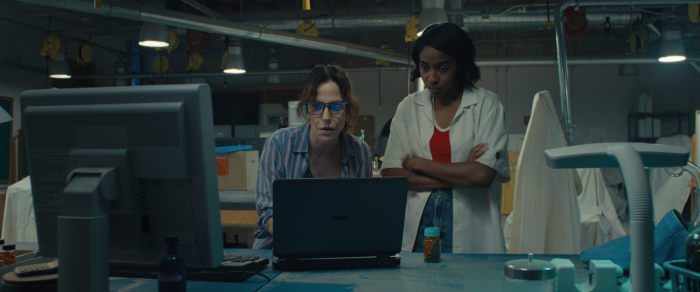In Netflix’s Russian Doll, the protagonist is stuck in a loop in which she keeps dying and waking up again on the same day as though nothing has happened—her struggle to figure out what’s going on forms the arc of the series. The eponymous star of The Truman Show is surrounded by a carefully controlled world that only starts to change when he becomes suspicious of it.
Omni Loop’s Zoya Lowe (Mary-Louise Parker) is neither confused about what is happening to her nor about the sameness of her days. She is, to an extent, in control, even though her doctor has told her that there is a “black hole” in the center of her chest and there is essentially nothing she can do about it. Her husband (Carlos Scott), daughter (Fern Katz), and soon-to-be son-in-law (Steve Maier) all attend to her with care, hoping to make her last days as special as they can. She herself is bored out of her mind, for she has lived this week countless times before. When she was a little girl, she found a bottle of pills that, when a single pill is ingested, gives her the ability to travel back (slightly) in time. So, every time she is about to die, she takes a pill and wakes up yet again in her hospital bed, face-to-face with her near-tearful daughter. These pills have not only helped her cheat death but have helped her get through school (Princeton) and informed the subject of her long-since aborted scholarly work on time travel.
Her boredom ends when, after getting so fed up with the repetitiveness of her days, she stumbles into Paula (Ayo Edebiri), a young student who is as passionate about physics as Zoya once was herself. She is, in fact, reading a book that Zoya has written. With the aid of the pills and the infinite time they buy her (the bottle apparently contains an infinite supply), she and Paula put their heads together to take up Zoya’s abandoned research and try to solve the mystery of time travel.
This is a rough one for reasons almost too numerous to list. The tone is sentimental, the dialogue bland, and the epiphanies are so rote that it’s hard not to wonder if AI was involved. The characters are, for the most part, so thinly conceived that it is almost pointless to critique the acting, though Parker effectively conveys the deadening quality of living a life of endless repetition, as well as a return of compassion later on. Edebiri, who was excellent in last year’s comedy Bottoms, does the best she can with what she is handed, and I don’t know what else she could have done with it. The filmmakers have given her nothing by way of personality but a weepy backstory. Otherwise, she asks questions convenient to the exposition.
Furthermore, for a movie about time travel, it has remarkably little fun with its premise. Its universe is one in which the butterfly effect essentially does not exist. There are no consequences to Zoya’s abandoning the script, so to speak, of her existence, other than that she realizes she misses her family. As such, it is suspiciously tidy. The Terminator and Back to the Future, perhaps unfair comparisons, have much higher stakes not only because they are action movies but because there is more that can go wrong when their characters journey through time. Omni Loop never risks fully losing itself in its narrative.
Nevertheless, there are a few saving graces. These come by surprise in the second half. They involve Zoya finding joy in what she had previously found deadening. Much of it is ridden with platitudes. Nevertheless, in the way it shows the taken-for-granted coming back to life, the film itself resuscitates, if only for a moment.

















Leave A Comment